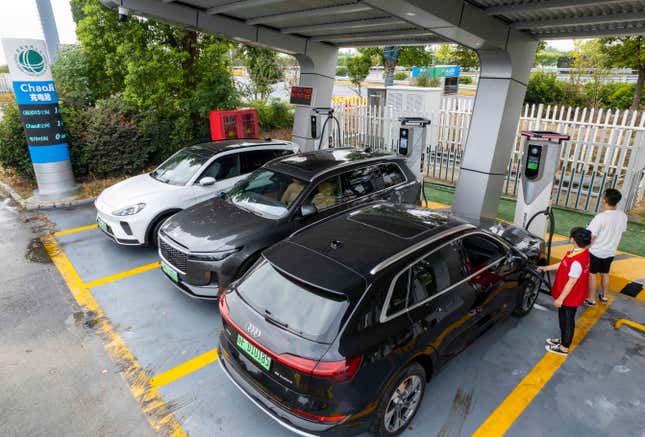China Will Spend Public Money To Get EV Sales Moving Again

China is wary of losing its title as the world’s biggest EV market now that sales of fully-electric cars are slowing. To regain the country’s EV sales momentum, the Ministry of Commerce is coordinating a six-month campaign that will use public funds to boost EV sales in rural communities and other areas outside of major cities, as Bloomberg reports.
How the Ministry of Commerce will reportedly do this is by encouraging banks and other financial institutions to make it easier to finance car purchases, especially EVs. And the six-month sales push will also spur on carmakers to lower the cost of EVs via subsidies and discounts. China wants to promote EV adoption throughout its 11,000 counties and villages, rather than allow EVs to cluster in major urban centers.
Photo: Yan Yicheng/VCG (Getty Images)
China’s EV sales saw record growth in 2022, jumping by 95 percent compared to 2021. But those sales have lost momentum as of late; reporting a 41 percent increase of sales from January to May of 2023. That’s growth, but China doesn’t quite see it that way when sales had increased by 120 percent during the same period in 2022.
In an attempt to arrest the decline, the State Council said it’s going to extend a tax break for EVs beginning in June, and China’s economic planning agency has now joined the bureau of energy to call for a robust EV infrastructure outside of major cities. The need for EV chargers is just part of the problem, however, and drivers also need help buying EVs, which is where the subsidies come into play.
Second-tier cities, such as Nanjing, will give out ¥35 million, or just under $5 million at current exchange rates, in vouchers meant to help buyers get into EVs. The vouchers will be worth up to ¥5,000 each, or about $700. And another city, Shenzen, has already given out ¥82 million (roughly $11.5 million) in vouchers for those who bought EVs throughout the early months of 2023.
The push to lower the price of EVs isn’t just from the state. Automakers are also joining in the push: GM’s joint venture with SAIC and Wuling in China has lowered the price of its massively popular Hong Guan Mini EV by up to ¥13,000 ($1,800 at current exchange rates). That makes the Wuling Mini cheaper than ever, and ought to boost the EV’s appeal.
Achieving greater sales in China would presumably fill in the gaps and recover the momentum that EVs are losing in the country, overall. But that’s going to be a bigger lift, which will require more robust EV infrastructure. However, it looks like China is prepared to take a page out of the U.S. playbook and throw money at a problem — anything to maintain its lead over EV sales in the U.S. and every where else.

Photo: CFOTO/Future Publishing (Getty Images)



